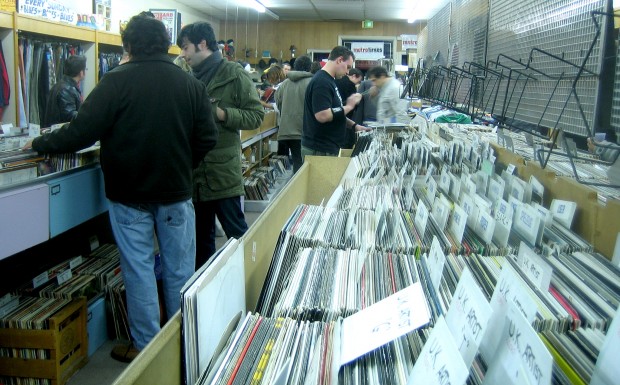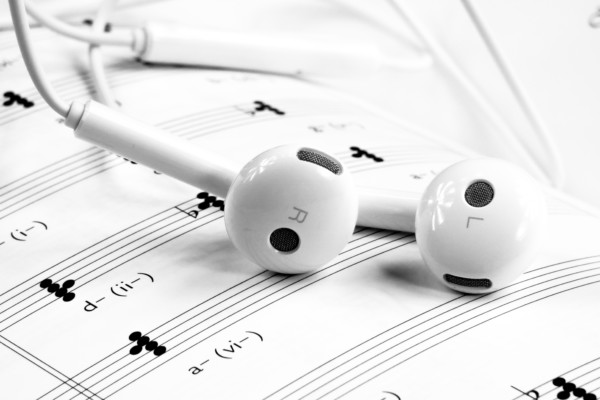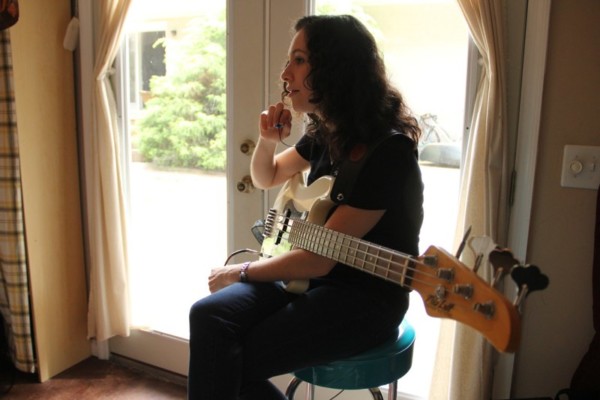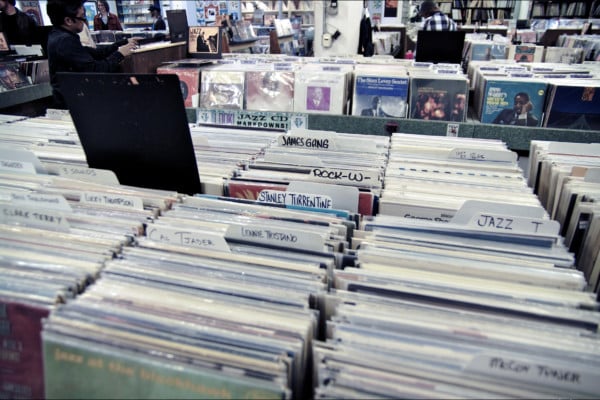The Lightbulb Moment: Check This Out

It’s the year 2015. Hours are spent each day scrolling though videos on Facebook, clicking links to YouTube, or listening to preset Pandora, Spotify, and Amazon stations. We experience music on television commercials or reality TV shows, with hashtags and at symbols telling us where to go if we happen to like the song that is fed to us. It has become an accompanying media, rarely experienced in solitude, and instead, existing to provide a soundtrack to driving, shopping, going to the gym, or passing time at work.
Twenty years ago, things were a bit different. Music was prevalent, but not anonymously predetermined. There were no algorithms, no strands of DNA to suggest songs you might “like.” Instead, musical discovery was a social activity, aided by the preferences of parents and siblings, the suggestions of teachers, or by friends’ concurrent journeys. Of course you’d discover songs on the radio, but once you heard something, you had to find it. There were no click-throughs, no apps, and no playlists. There were, however, record stores.
Ardmore, Pennsylvania, a suburb just west of the Philadelphia city line, was home to many small town treasures: a movie theater, a handful of restaurants, various clothing boutiques, banks, the post office, and of course, Mads Records. My dad was a frequent visitor, on a first name basis with the proprietor, and always eager to drag me along if we happened to eat dinner on the same block. The store was a shotgun barrel of musical euphoria; a few thin aisles with just enough room for one person to squeeze between the patrons sifting through the titles. The walls were lined by CDs and cassettes, with posters of dancing bears and giant red lips reaching to the ceiling. It always smelled the same—stale cork with a musty sweetness—as if you were standing with one foot in a wine store and the other in a lumberyard.
The front of the shop had a list of “picks” featuring the latest releases, artists touring the area, and compilations from Philadelphia’s independent radio station. I vividly remember looking at the cover of No Doubt’s release, “Tragic Kingdom,” pinned up by the door. There were bins of vinyl by our feet, a few concert tickets behind the desk, and world music towards the back of the store. You couldn’t leave empty handed, even if they didn’t have what you came in for.
In the early 2000’s, my relationship with the bass was just beginning. I quickly discovered that I was a novice to both the instrument and to music in general. At the time, my friends were listening to Weezer, I was immersed in 1960s soul music, and my father continued to be a relentless proponent of celtic, folk, and jazz. Entering the record store was overwhelming; I felt like an ant at the base of a mountain, wide eyed and wondering which path to take to the top. Selecting a record was like searching for an answer to a test question; the notion of “this looks good” wouldn’t cut it anymore. Instead, shopping would be based upon spying a record that “so and so” said I should hear, quickly shifting my purchases from pop, the genre, to pop, the technique.
Thankfully, I had a bass teacher who was happy to provide a much needed roadmap for navigating the record store terrain. My lesson book had a list of artists to check out and, while I rarely went shopping with it in hand, I hoped to stumble upon a name that sounded familiar.
One day, I found myself on an afternoon outing in downtown Ardmore, with Mads being the obvious destination. Accompanied by a friend, a saxophone player who had just gotten out of jazz band, we decided to make a beeline to the back of the store. Our hands began sifting through CDs, pulling the titles back one after the other, our eyes landing on a few names that we recognized from our respective collections.
“Hey, check this out,” my friend said. The cover was a striking: a black and white image of a thin man with powerful eyes, crossed arms, and the name Jaco Pastorius. The name was too strange to forget; I was quite sure that my teacher had scribbled it in my notebook. I walked out of the store with that record in hand, sold on the fact that Sam and Dave were featured on a song. I was completely naïve, not knowing the impact that purchase would have.
My discovery that day was a perfect storm of events; it was as if a diamond were coincidentally hidden in the back of my mind and in the bay of records. An imaginary flashlight clicked on, illuminating the title and connecting the dots. It became something I needed without really knowing why, and the act of physical discovery was as unique as the music on the record.
As I fast forward to 2015, I wonder if something like that could happen again; if young musicians get together and swap records or stories, if they pick out artists and albums to share with one another, and if the impact of listening to music is as great as it once was. In some ways, it may be too easy to stumble upon a monumental record like this. Could it be that with all of the things we Google on a regular basis, there’s nothing truly special about searching “Jaco” on iTunes?
With music being so accessible, I begin to worry that we will only experience the things we are given by algorithms. Or worse, by a select group of people who decide which twenty songs are popular for a brief period of time. I worry that music will become sterile, that the listener will be apathetic, and that the light bulb won’t burn bright enough to catch our eye. It would be too easy to scroll over a beautiful and life-changing moment amidst all of the information we filter through on a given day.
So what can we do about it? I believe it still comes down to the act of social musical discovery, to the people who get together face to face, discuss records, and urge each other to “check this out.” Hopefully, we learn about new music from our friends and from the people we respect. Rather than watch a YouTube video, follow a Spotify queue, or strain our ears to hear a clip from a smart phone, we take the time to sit down and fully experience those truly great records. There’s plenty of music that deserves our attention, and unless you’re on a mission to find it, it can be easy to miss.
Ryan Madora is a professional bass player, author, and educator living in Nashville, TN. In addition to touring and session work, she teaches private lessons and masterclasses to students of all levels. Visit her website to learn more!




God, I miss record stores. I was in my teens in the late 70s and early 80s. So many good times and stuff I still listen to today were discovered in those tiny, pungent shops.
The music stores were a place of discovery,meeting new friends,and great conversations.
BTW-There was plenty of face-to-face interaction because no one had a device in their hand.
Some things of yesteryear are very much missed.BASS ON and keep spinning !
Great piece!